Welcome to one of the best-kept secrets of my life.
Herein you will discover my musings, discoveries of the person of God, and parabolic tales such as this one. You will discover a young man who has endured two decades of service as soldier and son of the Most High. These words are pieces of me - the glories of triumph and the miry bog of capitulation - that in some way I hope remain undiscovered. Nevertheless, I have determined to remain bridled with my King’s heavenly purposes for me, and from this every word shall spring forward.
It will be bittersweet for you to discover my parables, but namely that of Eliel and His Seven Sons. One wonderful benefit of enduring the pressures of great responsibility is the written expressions of our grief. It was during a season of great trial and abandonment that I bore this story. I will deliberately omit any explanation as I hope the reader might peer through the looking-glass of my fictional tale and discover themselves therein. Please enjoy the fruit of my endurance.
In the age of the Scriptures there lived a farmer named Eliel [my God is God], who lived outside of the land of Gezer [Precipice], west of Jerusalem. Without anything but a handful of seeds, the man prayed and planted in the rocky soil beneath his feet. He prayed, “Lord, raise up a mighty crop, that I may bless You and glorify Your name.” After one year, there grew a mighty harvest beyond his wildest imagination. His harvest granted him great treasure at the city gates of Gezer, but His first-fruits he dedicated to Yahweh, and he was granted a greater measure of humility and wisdom.
The father quickly grew mighty in influence and possessed staggering power; the Gezerites knew him as a wise counselor and provider to many within the city. Although far from provisions lining the Judean desert and the Sea of Galilee, the man’s family was greatly blessed by Yahweh. With the spirit of God in his heart, he aspired to become the greatest of all the people of the east, as his ancestor Job once was.
Eliel bore 7 sons who grew in wisdom and stature, 7 daughters who walked with strength and dignity. Despite having many servants and slaves, he would command his sons to tend to the fields alongside the servants, saying, “reap the harvest I have sown!” For much of their youth, the sons obeyed their father in the sight of many counselors and of Yahweh, saying “Yes, master.” They were greatly blessed and grew in favor of Yahweh and the counselors at the gates of Gezer.
As the sons grew in age and understanding, the father remained steadfast in his commandment — “reap the harvest I have sown, alongside my many servants!” The sons, however, grew weary of their father, lacking understanding of his commands and forsaking the work of his hands. They said “yes” to their master, but one by one, the sons slowly turned to various passions and pursued the desires of their heart.
Some gave themselves to women, others to the work of their own hands, and some even sought to reap a harvest of their own making. However, the seventh son, Ammiel [God is my Kinsmen] obeyed his father.
When Ammiel entered the field to harvest, to his surprise, he was without his kin. As he plowed the fields alone, he remembered them say “yes, master,” and was filled with the sorrow of their absence. As he shouldered the burden of his six brothers, he grew weary and his strength was spent.
He cried out to Yahweh, saying,
“How must I shoulder the burden of my kinsmen, who have forsaken me?
Where are the righteous, that they might plow alongside me? [Prov. 20:6]
Though it may slay me, I will obey my father Eliel;
‘Yet even if my kin abandon me, You will hold me close.’” [Ps. 27:10]
At that very moment, Eliel cried out to Ammiel, saying, “My son, my son! Come and rest at your father’s feet; you have done well, for you have been faithful. Let my servants finish the work of your brothers.”
The sixth brother, Reuel, clothed Ammiel as he entered the house of his father and he rested.
This painting is called A Herefordshire Lane by David Cox.




